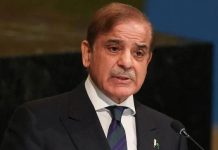ISLAMABAD, APR 30 /DNA/ – The China-Pakistan Study Centre (CPSC) at the Institute of Strategic Studies Islamabad (ISSI) organized a special seminar to commemorate the 70th Anniversary of the historic Bandung Conference, titled “The Bandung Spirit (1955–2025): Seven Decades of Solidarity, Sovereignty, and South-South Cooperation.” Senator Mushahid Hussain Sayed graced the occasion as the Chief Guest. The distinguished panel included Ambassador Zamir Akram, Pakistan’s former Permanent Representative to the UN in Geneva; Ambassador Dr. Mohammad Nafees Zakaria, Executive Director of COMSATS; Mr. Rahmat Hindiarta Kusuma, Chargé d’Affaires at the Embassy of Indonesia in Pakistan; and Dr. Salma Malik, Associate Professor, Department of Defence and Strategic Studies (DSS).
In his welcome remarks, Ambassador Sohail Mahmood underscored Pakistan’s key role in the 1955 Bandung Conference and highlighted the significance of the ‘Bandung Spirit’ based on solidarity, sovereignty, peaceful coexistence, and South-South cooperation. Ambassador Sohail Mahmood recalled that the Bandung Conference was preceded by the enunciation of “five Principles of Peaceful Coexistence”-mutual respect for sovereignty and territorial integrity, mutual non-aggression, non-interference in internal affairs, equality and mutual benefit, and peaceful coexistence — which were articulated with primary role of the Chinese Premier Zhou Enlai. He added that the leaders at the Bandung Conference through their 10-point Declaration presented an alternative, non-Western vision of international relations — one that challenged the long-dominant Western paradigm. He maintained that strategic partnership with China and engagement with platforms like the SCO and BRI are evidence of Pakistan’s commitment to the ‘Bandung Spirit’. While acknowledging recent skepticism about Afro-Asian solidarity, he reaffirmed the growing relevance of the ‘Global South’ in shaping a more just and inclusive world order. He also emphasized the importance of practical cooperation to further strengthen mutual bonds and advance the agenda of peace and development.
Senator Mushahid Hussain Sayed highlighted the profound historical significance of the Bandung Conference, which marked a pivotal moment in global politics, especially for the developing nations of Asia and Africa. He emphasized the importance of China’s emergence in international diplomacy, under the leadership of Premier Zhou Enlai, who played a key role in shaping the conference’s key principle of peaceful coexistence. He further stressed the lasting impact of Bandung in fostering solidarity among the Global South and its influence on global movements, including the African-American struggle for equality. He also underlined the enduring spirit of Bandung, which continues to inspire unity and cooperation in today’s international relations.
Ambassador Zamir Akram, highlighted the role of the Bandung Conference as a pivotal moment in the Global South’s assertion against colonialism and imperialism, leading to the birth of the Non-Aligned Movement. He noted the consistent efforts by major powers to suppress movements in developing countries. He acknowledged the role of the People’s Republic of China as a steadfast supporter of South-South solidarity and cooperation. He also emphasized the importance of the evolving multipolar world order and China’s constructive initiatives such as the BRI, SCO, and AIIB.
Ambassador Dr. Mohammad Nafees Zakaria reflected on the role of Bandung Spirit in promoting South-South cooperation. He highlighted the shift from a bipolar to a multipolar world but stressed the importance of mutual reliance among developing nations. He called for enhanced collaboration to reduce dependence on external powers and tap into shared human and natural resources. Strengthening such cooperation is essential to bridging the gap between developed and developing nations.
Mr. Rahmat Hindiarta Kusuma, Chargé d’Affaires of the Embassy of Indonesia, emphasized the significance of the Bandung Spirit in today’s uncertain global landscape. He highlighted the 1955 Asia-Africa Conference as a landmark in promoting solidarity, sovereignty, and South-South cooperation. Stressing peaceful conflict resolution and regional collaboration, he called for renewed commitment to strategic trust and unity, particularly among South Asian nations, to uphold global peace and stability.
Dr. Salma Malik deliberated upon the lasting importance of the spirit of Bandung Conference, highlighting its foundation in unity, inclusivity, and mutual respect among diverse nations. She laid emphasis on concrete action, especially in addressing current global challenges. Praising China’s role in South-South cooperation, she pointed to initiatives like the Belt and Road Initiative as modern reflections of the Bandung vision. Dr. Malik also called for greater focus on non-traditional security issues such as food, health, and education.
Earlier, in his introductory remarks, Director CPSC Dr. Talat Shabbir highlighted the relevance of the Bandung Spirit in promoting solidarity, sovereignty, and South-South cooperation.
Ambassador Khalid Mahmood, Chairman BoG ISSI, in his vote of thanks underscored the relevance of the ten-pointdeclaration adopted by the Bandung Conference. He called for renewed solidarity among developing countries to resist external divisive influences.
The event was well-attended by a diverse audience, including diplomats, academics, think-tank experts, representatives from civil society, and members of the media.

















